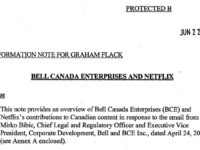The Quebec Superior Court has ruled that the provincial rules creating a mandated ISP blocking system for unlicensed online gambling sites is unconstitutional. The provincial government introduced the rules in 2015, which create a list of unlicensed sites that ISPs must block or face financial penalties. While the government tried to frame the blocking system as a health and safety measure, it was always obvious from its own documentation that the plan was primarily focused on increasing revenues of Loto-Quebec, a provincially licensed online gambling site.
News
The State of Canadian Wireless in One Chart: No One Has Carriers That Generate More Revenue With Less Usage
Tefficient has released a new report on global wireless market that makes it clear that Canada is a global outlier (or leader if you are a telecom executive). Simply put, no one has carriers that generate more revenue with less usage per SIM than Canada.
Movie Industry Denies Lawsuit Strategy Despite Proliferation of Legal Actions and Settlement Demands Against Thousands of Canadians
Over the past several years, hundreds of thousands of Canadians have received notifications from movie and television interests threatening high-priced lawsuits unless they agreed to pay settlement fees. Moreover, a recent strategy led by the law firm Aird & Berlis has resulted in hundreds of actual legal filings against individuals, using a reverse class action strategy described as a “legal machine”. Yet despite the proliferation of lawsuits and demand letters, the head of the movie industry in Canada recently told the Standing Committee on Industry, Science and Technology that lawsuits against individuals were not part of their legal strategy.
Government Memo Suggests Netflix Outspends Canadian Private Broadcasters on Canadian English Scripted Programming
Canadian Heritage Minister Melanie Joly view of cultural policy shifted gears in recent months with her emphasis on the need for all players to contribute and rhetoric on “no free rides”, a position that could lead to taxes on Internet services. While Netflix has been a popular target for many Canadian cultural organizations, according to documents released under the Access to Information Act, Canadian Heritage officials appear to have evidence that Netflix spends more on Canadian English-language scripted programming than the Canadian private broadcasters. The revelations come in a June 2017 internal memo to Graham Flack, the Canadian Heritage Deputy Minister, which respond to correspondence from BCE’s Mirko Bibic. Bibic met with Flack in April 2017 and was concerned with department comments about Netflix outspending Bell.











